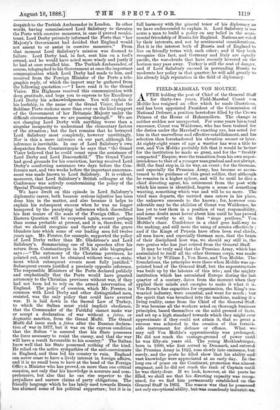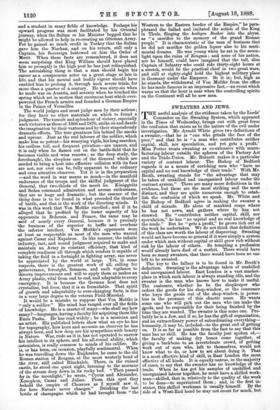FIELD-MARSHAL VON MOLTS:E.
AR holding the post of Chief of the General Staff for thirty-two years, Field-Marshal Count von Moltke has resigned. an office which he made illustrious, and has been appointed President of the Commission Of National Defence, a position heretofore filled by the Crown. Princes of the House of Hohenzollern. The change is neither sudden nor unexpected. For some years his actual successor, Count von Waldersee, who has been trained for the duties under the Marshal's exacting eye, has acted for him in that marvellous and effective establishment, and his selection then foreshadowed his elevation sooner or later. At eighty-eight years of age a warrior has won a title to rest, and Von Moltke probably felt that it would be better for the institution he made so great, and. for the "freshly compacted" Empire, were the transition from his own super-. intendence to that of a younger man gradual and not abrupt. Still, the final step is, in its way, an event ; for the German, and especially the Prussian Army, has become so acciis- tomed to the guidance of this great soldier, that although he remains in a higher sphere, and. will be until he dies a. chief directing agent, his retirement from the post with' which his name is identified, begets a sense of something 'wanting, something which was and will be no more. The tried man departs, the untried man enters in his plebe, the unknown succeeds to the known ; for, however con.. siderable may be the abilities of Count von Waldersee, has yet to test them in a position of vast responsibility, and some doubt must hover about him until he has proved himself worthy to sit in that "siege perilous," Von.- Moltke's chair. Confidence in a chief goes half-way to the making, and still more the using of armies effectively ; and if the Kings of Prussia have often been real chiefs,. all men know, and. especially German men, that the brain of their disciplined host was, we should say still is, the rare genius who has just retired from the General Staff.
It may be truly said that the Prussian Army, which has assimilated to itself all the other German corps, was made. what it is by William I ,Von Boon, and Von Moltke. The ■ foundations, the principles were there when Moltke was ap- - pointed head of the General Staff, but the superstructure was built up by the labours of this trio ; and the mighty institution which has astonished Europe during the last quarter of a century, dates from the moment when they applied their minds and energies to make it what it is. Von Boon's fine capacities -for organisation, the King's um.. wearied industry, were essential, and went for much ;. but the spirit that was breathed into the machine, making it a living reality, came from the Chief of the General Staff. It was because all the workers acted on thorough business principles, based themselves on the solid ground of facts, and set up a high standard towards which they might ever approximate if they could not attain it, that so great a, success was achieved in the creation of this formid- able instrument for defence or offence. What we may mill Von Moltke's apprenticeship was prolonged... He did not reach the vantage-ground. of power until' he was fifty-six years old. The young Mecklenburger, born in 1800, who- first served in Denmark, and entered. the Prussian Army in 1822, rose slowly into eminence, but surely, and the posts he filled show that his ability and vast knowledge were appreciated at an early day. In the: long era of peace on the Continent, promotion was almost, stagnant, and he did not reach the rank of Captain until. he was thirty-four. If we look, however, at the posts he filled, we shall see that his directing capacity was recog,. nised, for we find him permanently established on the General Staff in 1882. The reason was that he possessed not only exceptional ability, butawas ceaselessly industricus, and a student in many fields of knowledge. Perhaps his upward progress was most facilitated by his Oriental journey, when the Sultan or his Minister begged that he might be allowed to help in re-creating an Ottoman Army. For he gained so much credit in Turkey that the Sultan gave him the Nischan, and on his return, still only a Captain, his Sovereign bestowed on him the Order of Merit. When these facts are remembered, it does not seem surprising that King William should have placed him so promptly in the high post he has just relinquished.
The astonishing thing is that a man should begin his career as a conspicuous actor on a great stage so late in life, and that his mental and bodily vigour should have enabled him to prolong it, through such severe trials, for more than a quarter of a century. He was sixty-six when he made war on Austria, and seventy when he touched the spring which set in motion that enormous host which over- powered the French armies and founded a German Empire in the Palace of Versailles.
The world judges and must judge men by their actions ; for they have no other materials on which to found a judgment. The tumult and splendour of victory, especially such victories as those of 1866 and 1870, strike on and dazzle the imagination by their vastness and by their stupendously dramatic effects. The true greatness lies behind the smoke and uproar. Just as the real labours of the soldier, which make him so potent—his wearying vigils, his long marches, his endless toil, and frequent privation—are unseen, and it is only when he flames out on the battle-field that he 'becomes visible and wins renown ; so the deep study, the forethought, the sleepless care of the General which are needed to bring a host into effective collision with its foes are not, nor ever can be, fully apparent to the ordinary and even attentive observer. Yet it is in the preparation —and the word in war means so much—in the manifold endurance of the troops and the skilful judgment of the General, that two-thirds of the merit lie. Kiiniggratz and Sedan command admiration and arouse enthusiasm, they are so huge and dramatic ; but the essence of the thing done is to be found in what preceded the thunder of battle, and that is the work of the directing minds. It was in this work that Von Moltke excelled ; and if it be alleged that he profited by the lesser capacity of his opponents in Bohemia and France, the same may be said of nearly every General, because it is precisely the business of the superior to baffle and overbear -the inferior intellect. Von Moltke's opponents were at least as respectable as most of the men who warred against Ciesar and Napoleon. In like manner, the infinite industry, tact, and sound judgment required to make and maintain an Army in constant efficiency, that kind of complete readiness all through which renders it capable of taking the field in a fortnight in fighting array, can never be appreciated by the world at large. Yet, in some respects, there is the greatest work of all, calling for perseverance, foresight, firmness, and such vigilance to discern improvements and will to apply them as makes an Army plastic, vital from end to end, and adaptable to every emergency. It is because the German host does not crystallise, but lives, that it is so formidable. That spirit .of growth and adaptability to ever-changing facts, is due in a very large degree to the veteran Field-Marshal. It would be a mistake to suppose that Von Moltke is " only a soldier." His mind has ranged over all the fields of knowledge. He is a master of many—who shall say how many 2—languages, having a faculty for acquiring them like Emin Pasha. He has read widely ; he is a musician and an artist. His published letters show what an eye he has for topography, how keen and accurate an observer he has always been, and how deep are his sympathies with beauty in Nature. War, rude as it is, has not operated to narrow bis intellect to its sphere, and his all-round ability, which _astonishes, is really common to minds of his calibre. He is, or has been, on occasion, playfully sentimental. When he was travelling down the Euphrates, he came to the old Roman station of Zeugma, at the most westerly bend of Ake river, still called Rilmkaleh. There, in the ruined 'castle, he stood one quiet night, listening to the murmur of the stream deep down in its rocky bed. "Then passed by in the moonlight," he wrote, "Cyrus and Alexander, Xenophon, CEesar and Julian. From this spot they beheld the empire of Chosroes as I myself saw it, for here Nature never changes." Drinking the last bottle of champagne which he had brought from "the Western to the Eastern border of the Empire," he pars, phrased the ballad and imitated the action of the King in Thule, flinging the heiligen Becher into the abyss, as "a sacrifice to the memory of the grand Roman people." It is characteristic of the man of business that he did not sacrifice the golden liquor also to his senti- mental dreams. He was young when he sat in the moon- light upon the ruins of Zeugma ; and none of his nation, nor he himself, could have imagined that the tall, slim Captain of Infantry who could ride thirty-eight hours at a stretch, would be the practical chief in two great wars, and still at eighty-eight hold the highest military place in Germany under the Emperor. So it is ; but, high as he stands, the withdrawal of Von Moltke from the office he has made famous is an impressive fact,—an event which warns us that the hour is near when the controlling spirits on the Continent will all be new men.



































 Previous page
Previous page